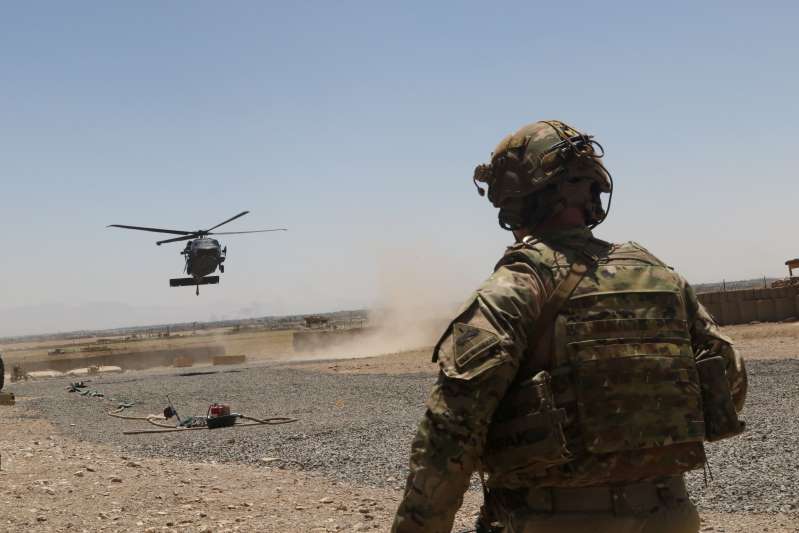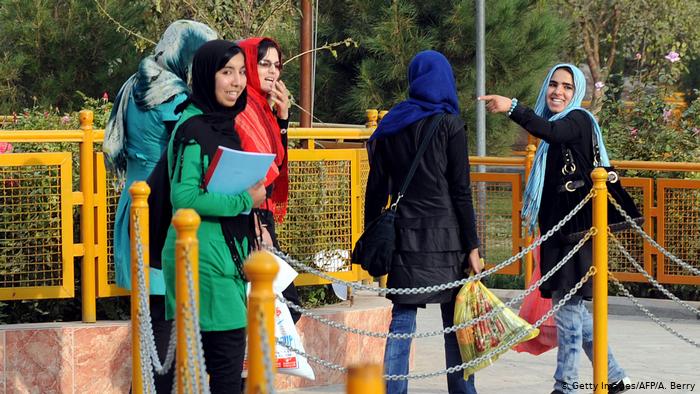www.aljazeerah.info
News, February 2020
Archives
Mission & Name
Conflict Terminology
Editorials
Gaza Holocaust
Gulf War
Isdood
Islam
News
News Photos
Opinion Editorials
US Foreign Policy (Dr. El-Najjar's Articles)
www.aljazeerah.info
|
Editorial Note: The following news reports are summaries from original sources. They may also include corrections of Arabic names and political terminology. Comments are in parentheses. |
US-Taliban Agree on a Seven-Day Reduction in Violence, Before Signing a Peace Deal, Endig 18 Years of War
February 17, 2020
 |
 |
| US soldier watching a blackhawk helecopter in Afghanistan, August 4, 2019 | Afghani women in a park designated for women, file, February 17, 2020 |
The First Steps Toward an Afghan Peace Deal
With a seven-day reduction in violence agreed, the United States and the Taliban are paving the way to an end to the war in Afghanistan.
By Audrey Wilson
February 17, 2020
Here is today’s Foreign Policy brief: The United States and the Taliban take preliminary steps toward an Afghan peace deal, Turkey and Russia hold talks over the situation in northwest Syria, what to watch in the world this week.
U.S., Taliban Move Toward Deal
The United States and the Taliban again appear to be taking steps toward peace in Afghanistan after U.S. officials announced a seven-day reduction of violence on Friday at the Munich Security Conference. The temporary truce is “very specific,” applying nationwide and including Afghan government forces. If successful, it will mark the first steps toward a deal to bring an end to the 18-year war in Afghanistan, where around 13,000 U.S. troops remain.
U.N. Secretary-General António Guterres and U.S. Afghanistan envoy Zalmay Khalilzad are in Pakistan today for a conference addressing the future of Afghan refugees after decades of war. The possibility of a peace deal raises questions about reintegration and international support for host countries. Around 3 million Afghan refugees live in Pakistan and more in Iran—which has increased deportations over the last year, as Ruchi Kumar and Hikmat Noori reported for FP in January.
Will the truce hold? If the reduction of violence lasts, it will be a shift after a violent year in Afghanistan. In September, the United States and Taliban leaders were close to a deal but U.S. President Donald Trump called off secret negotiations after a Taliban attack killed a U.S. service member in Kabul. The signing of a U.S.-Taliban peace agreement has been scheduled tentatively for Feb. 29, according to an Afghan official.
What’s in the deal? The agreement between the United States and the Taliban would create a 135-day timetable for a U.S. drawdown in Afghanistan and call for a complete withdrawal within three to five years. It would also kickstart negotiations including the Taliban and the Afghan government next month.
Taliban Claims to Have Finalized Peace Deal With the U.S.
By David Brennan
Newsweek, February 17, 2020
A Taliban spokesperson has claimed that the organization has finalized a peace deal with the U.S. to end more than 18 years of war.
Suhail Shaheen told Afghan television station 1TV on Monday that the two parties had reached an agreement and suggested the deal would be signed by the end of February. Newsweek has contacted the State Department to confirm Shaheen's report.
Afghan Chief Executive Abdullah Abdullah confirmed to the TOLOnews channel that a deal had been agreed, though noted that whether it is signed will depend on the success of a proposed period of reduced violence.
"The agreement between the Taliban and U.S. has been finalized and the signing of the agreement is based on the reduction in violence over seven days and then it will continue," Abdullah explained. "It is also an opportunity for the opposite side to show that they want peace in the country."
The U.S. has been negotiating an end to the country's longest running war since July 2018. A deal seemed close at hand in September 2019, and President Donald Trump had even reportedly organized a secret summit with Taliban leaders at Camp David. But negotiations collapsed again after the Taliban took credit for the death of a U.S. soldier.
Trump declared the peace process "dead" after that failure, but negotiations have continued led by U.S. Special Representative for Afghanistan Reconciliation Zalmay Khalilzad.
This weekend, Secretary of Defense Mark Esper said the U.S. plan for reduced violence is the first step in any lasting peace deal.
"There is a reduction in violence period, and then we have to consider whether or not to move forward with the agreement, with the peace agreement," he told reporters in Munich, Germany.
He added that the U.S. also plans to cut troop numbers to around 8,600 from the current level of between 12,000 and 13,000. Nonetheless, Esper explained that these steps remain "conditions based."
Over the weekend, Afghan President Ashraf Ghani warned that his government would evaluate any deal practically, and warned that the Taliban could be using a "Trojan Horse strategy" to undermine U.S. and government forces. Still, Ghani said his administration would "take a substantial step forward" and give the deal a chance to succeed.
The Taliban have thus far refused to negotiate directly with the Afghan government, dismissing it as a puppet administration controlled by Washington. An eventual peace deal may see the ultra-conservative Taliban re-enter Afghan politics, a development feared by civil and women's rights campaigners, who were brutally repressed under the group's rule from 1996 to 2001.
Afghan peace deal, but at what cost?
DW, February 17, 2020
The West appears to be making many concessions to the Taliban to forge a peace deal. Do they also involve a compromise on fundamental human rights? DW talks to the head of Friedrich-Ebert Foundation in Afghanistan.
DW: A peace deal between the US and the Taliban seems imminent. What impact will it have on Afghanistan?
Magdalena Kirchner: A US-Taliban agreement can pave the way for a meaningful and sustainable intra-Afghan dialogue. At the same time, it will all be meaningless if the possible deal leads to security deterioration in the country.
The US and the Taliban, as well as the Afghan government, have signaled a commitment to intra-Afghan negotiations and a political solution, but it remains unclear whether the dynamics will change after a deal between the US and the Taliban is signed.
It is also possible that many parties to the conflict will resort to violence immediately after the deal is sealed. In that case, we will see a similar situation to the 1990s Afghan civil war.
Will a deal make it difficult for international human rights organizations to work in Afghanistan? What kind of challenges are you expecting?
It will certainly become more challenging. The security situation is already limiting our reach beyond Kabul. But it could also force international organizations to invest more in the training and capacity building of the local staff.
People often ask us how we plan to preserve the achievements that we have made in the past two decades in Afghanistan. I believe that we need to put out all these issues during the intra-Afghan dialogue.
We are committed to upholding our values and expect that these would be a part of discussions. It is up to Afghan decision-makers to ensure that all Afghans benefit from democracy, the freedom of speech and women's rights.
What should the US and Afghan authorities not compromise on for the sake of a peace deal?
We saw in Syria that the principles become useless if you can't defend them, and if you are not in the driving seat. I am concerned that many countries, which prefer stability over a meaningful peace, will pursue a post-deal policy of containment and not an active engagement with Afghanistan.
I believe that many international negotiators are trying to convince those sitting on the fence that a peace agreement should not compromise on human rights. But who is in a position to promise that amid so much uncertainty? Is there any compromise that can guarantee peace? I don't think so. Maybe we should talk more about what Afghans can gain from a peace deal rather than focusing on things that we can lose.
It is also unrealistic to think that there could be one big compromise that will be acceptable to all Afghans. A post-deal Afghanistan will remain diverse and divided, therefore we should take the peace process as an opportunity for Afghanistan's formal and informal political institutions to mature and be able to solve conflicts in a non-violent manner.
Who are the Taliban and what do they want?
Can Western countries, including Germany, justify their potential help to a future Afghan government with the Taliban holding key positions?
Many people see negotiations with the Taliban as an act of betrayal, especially with regard to the rights of women and minorities. Thes people have always opposed Germany's military role in Afghanistan and will certainly not support a bigger involvement. But I think that the failure to defeat the Taliban militarily and politically has made people more pragmatic. It can be argued that a deal with the Taliban is the only path to stabilization.
What role can Germany play during and after the peace process?
There is a desire for a significant German role during and after the peace process. Germany is a major donor to Afghanistan and has developed strong relations with the government and different opposition parties in the past years. Germany is considered neutral by many Afghans and is certainly better positioned than many other countries.
At the same time, Germany cannot isolate itself from the developments in and around Afghanistan. Migration remains one of the most divisive issues in Germany since the 2015 refugee crisis. Berlin can come up with a real strategy for the post-deal Afghanistan. Also, Kabul will need a strong German and European commitment during this process. The upcoming German EU presidency could be a great opportunity to achieve these goals.
Magdalena Kirchner is the country director of Friedrich-Ebert Stiftung (Foundation), a German think-tank, in Afghanistan.
https://www.dw.com/en/afghan-peace-deal-but-at-what-cost/a-52389485
***
Share the link of this article with your facebook friendsFair Use Notice
This site contains copyrighted material the
use of which has not always been specifically authorized by the copyright
owner. We are making such material available in our efforts to advance
understanding of environmental, political, human rights, economic,
democracy, scientific, and social justice issues, etc. We believe this
constitutes a 'fair use' of any such copyrighted material as provided for
in section 107 of the US Copyright Law. In accordance with Title 17 U.S.C.
Section 107, the material on this site is
distributed without profit to those
who have expressed a prior interest in receiving the included information
for research and educational purposes. For more information go to: http://www.law.cornell.edu/uscode/17/107.shtml.
If you wish to use copyrighted material from this site for purposes of
your own that go beyond 'fair use', you must obtain permission from the
copyright owner.
|
|
|
|
||
|
||||||


